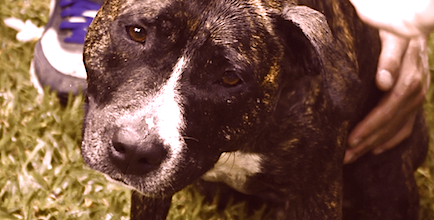Understanding and Addressing Itchy Dog Feet: Common Causes and Solutions
Discover the common causes of itchy dog feet and how to alleviate your pet’s discomfort. Learn effective solutions to help your dog feel better.
This pet health content was written by a veterinarian, Dr. Debora Lichtenberg, VMD. It was last reviewed on July 8, 2024


Don’t leave your pet’s safety to chance
Sign up for Petful recall alerts today.

Understanding Itchy Dog Feet
Itchy dog feet are a common concern among pet owners. This condition can cause significant discomfort for dogs and can be challenging to diagnose and treat due to the variety of potential causes.
Common Causes of Itchy Dog Feet:
- Seasonal Allergies: Often related to specific times of the year, such as fall.
- Age Factor: Some dogs may experience worsening symptoms as they age.
- Widespread Issue: Many dog owners encounter similar issues, indicating a common problem.
However, much of the advice circulating online can be misleading. It’s essential to rely on accurate information and consult with a veterinarian for a proper diagnosis and treatment plan.
Common Misconceptions About Itchy Dog Feet
Itchy dog feet can be caused by various factors. Here, we address some common misconceptions and provide accurate information to help you understand and manage this issue.
Food Allergy
Pam’s dog, Binky, was licking her feet and had her blood tested for allergies, and thereafter diagnosed with an allergy to chicken.
- Non-Seasonal Itching: Food-allergic dogs itch all the time until the allergen is removed from their diet.
- Diagnosis: Blood testing does not diagnose food allergies. Dogs must be put on a limited-ingredient, novel diet to be diagnosed with a food allergy.
- Bo’s Case: Since Bo only licks his feet seasonally, a food allergy is unlikely. For more details on food allergies in pets.
Mange
Micky suggested that Bo was suffering from sarcoptic mange, a condition more prevalent in the fall.
- Contagious Nature: Sarcoptic mange is contagious and can be contracted from foxes or other dogs.
- Symptoms: Mange causes intense itching all over the body, not just the feet. Dogs with mange typically have an unpleasant odor. For more information on sarcoptic mange.

Lawn Chemicals
Beverly asked if the lawn had been sprayed recently, suggesting chemicals might be the cause.
- Acute Response: Exposure to lawn chemicals usually triggers an acute inflammatory response.
- Bo’s Symptoms: Bo’s gradual and seasonal licking suggests a different cause. Exposure to a caustic agent could be another reason for itchy dog feet.
Foreign Body in the Foot
John shared that his dog, Bailey, licked between his toes due to a thorn in his foot.
- Specific Area: Foreign bodies cause licking in a specific area, usually one foot, not all four. Foreign bodies can certainly cause itchy dog feet.
Grass Allergy
Marcy suggested Bo might be allergic to grass, recommending washing his feet after being outside.
- Allergens: Grass allergens, likely pollens, penetrate the skin and are inhaled. Simply washing the feet may not be enough to prevent symptoms.
- Practicality: Washing all four feet every time the dog goes outside is often impractical. Dogs can be allergic to grass, leading to itchy dog feet.
These pups don’t seem to have a problem with grass:
Yeast Infections in Dog Paws
Yeast infections are a common cause of itchy dog feet. These infections can occur when yeast, a type of fungus, overgrows on your dog’s paws, leading to discomfort and persistent itching.
- Symptoms: Redness, swelling, and a foul odor are typical signs. Your dog may also excessively lick or chew at their paws.
- Treatment: Consult your vet for appropriate antifungal medications. These may include oral antifungal pills, topical creams, wipes, or medicated shampoos. Keeping your dog’s paws clean and dry can help prevent infections from recurring.
- Prevention: Regularly inspect and clean your dog’s paws, especially after outdoor activities. Maintaining a balanced diet can also support overall paw health and reduce the risk of yeast infections.
By addressing yeast infections promptly, you can alleviate your dog’s itchy dog feet and improve their quality of life.
Home Remedies for Itchy Dog Feet
Home remedies can provide relief for dogs suffering from itchy dog feet. Here are some effective at-home treatments:
- Apple Cider Vinegar: Dilute apple cider vinegar with water (50/50) and apply it to the itchy spots on your dog’s paws. This solution can be used as a spray or a soak.
- Bathing and Wiping: Use a moisturizing or allergy-reducing shampoo to bathe your dog, which can help remove surface allergens. Wiping your dog’s paws with baby wipes after coming indoors can also reduce irritants.
- Paw Balms: If your dog has dry or cracked paw pads, applying a paw balm can help add moisture and soothe inflammation.
- Dietary Changes: Switching to a diet designed for sensitive skin or with limited ingredients can reduce symptoms if food allergies are suspected. Avoid grain-free diets unless recommended by your vet due to potential heart health risks.
Always consult your veterinarian before starting any home remedy to ensure it’s safe for your pet.
Role of Omega-3 Fatty Acids
Omega-3 fatty acids play a crucial role in maintaining healthy skin and reducing inflammation, which can help alleviate itchy dog feet.
- Benefits: Omega-3 fatty acids have anti-inflammatory properties that can help reduce itching and promote healthier skin and fur.
- Sources: These fatty acids can be found in fish oil supplements and certain types of fish, like salmon. You can also find specially formulated dog foods that include omega-3 fatty acids.
- Dosage: Consult your veterinarian to determine the appropriate dosage for your dog based on their size and specific needs.
Integrating omega-3 fatty acids into your dog’s diet can provide significant relief from itchy dog feet and contribute to overall skin health.

Atopic Dermatitis
When a dog is allergic to grasses, trees, and pollens, they suffer from atopic dermatitis and itch. People allergic to these allergens usually exhibit runny eyes, noses, and other respiratory symptoms. Similarly, dogs need appropriate medications to manage their symptoms.
- Persistent Itching: If your dog is scratching and itching anywhere on their body for more than a week, don’t wait to see if it goes away on its own—chances are it won’t. Relieving allergy symptoms sooner than later is key.
- Lesion Development: The longer your pet keeps scratching and biting at themselves, the worse the lesions will become, and the longer it will take to relieve the symptoms.
Treatment Options:
- Over-the-Counter Medications: These may help your dog, but they are not as useful in pets as in humans.
- Veterinarian Consultation: Consult your veterinarian about using antihistamines and anti-allergy medications.
If the foot licking or generalized itching does not improve, bring your dog in for a vet visit. Prescription medications are often needed, and you’ll both be glad you did.
Dogs that suffer from atopic dermatitis and itch require timely intervention for effective relief.
Final Thoughts and Conclusion
Managing itchy dog feet involves understanding the root causes and applying effective remedies. Here’s a quick summary:
- Common Causes: Food allergies, mange, lawn chemicals, foreign bodies, grass allergies, and atopic dermatitis.
- Home Remedies:
- Use diluted apple cider vinegar.
- Bathe with moisturizing or allergy-reducing shampoos.
- Apply paw balms for dry or cracked pads.
- Consider dietary changes for food allergies.
- Omega-3 Fatty Acids: Helps reduce inflammation and promotes healthy skin and fur.
Remember:
- Always consult with a veterinarian for accurate diagnosis and treatment.
- Combine professional care with home strategies for best results.
By taking these steps, you can help your dog overcome itchy feet and enjoy better health.
Frequently Asked Questions (FAQ)
Why does my dog have itchy feet?
Your dog may have itchy feet due to allergies, infections, parasites, or environmental irritants, such as grass or chemicals
What can I give my dog for itchy feet?
You can give your dog antihistamines, omega-3 supplements, or apply topical treatments like medicated shampoos and paw balms, but always consult your veterinarian first
References
- “Your Dog’s Itchy Paws: 5 Causes and 6 At-home Remedies.” Dr. Buzby’s ToeGrips for Dogs. https://toegrips.com/dog-itchy-paws/
- “Dog Paw Yeast Infections: Symptoms, Treatment, and Prevention.” Dr. Buzby’s ToeGrips for Dogs. https://toegrips.com/dog-paw-yeast-infections/
- “Allergy Medicine for Dogs: 9 Solutions to Calm Your Dog’s Itch.” Dr. Buzby’s ToeGrips for Dogs. https://toegrips.com/allergy-medicine-for-dogs/
- “Stop Itchy Paws in Their Tracks.” MetLife Pet Insurance. https://www.metlifepetinsurance.com/blog/pet-health/stop-itchy-paws-in-their-tracks/
- “Itchy Paws in Dogs: 5 Causes.” Vetnique Labs. https://www.vetniquelabs.com/blogs/vets-corner/itchy-paws-in-dogs-5-causes








